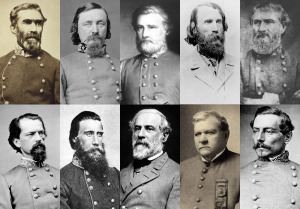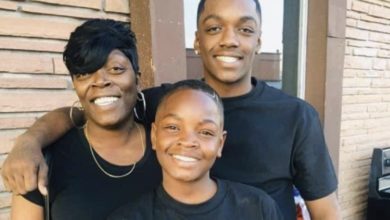 As the calls rise to get rid of the many thousands of flags, public statues, street names, school names, public park names and so much more that honor the confederacy and the KKK, the Pentagon has faced questions about the ten major bases on U.S. soil named after confederate generals.
As the calls rise to get rid of the many thousands of flags, public statues, street names, school names, public park names and so much more that honor the confederacy and the KKK, the Pentagon has faced questions about the ten major bases on U.S. soil named after confederate generals.
In response to these questions, the Pentagon has stated that there are no plans to discuss changing base names. Brig. Gen. Malcolm Frost, a chief spokesmen for the Army, said that every Army base is named for a soldier “who holds a place in our military history. Accordingly, these historic names represent individuals, not causes or ideologies. It should be noted that the naming occurred in the spirit of reconciliation, not division.”
A spirit of reconciliation? With slavery? White supremacy? He certainly does not mean reconciliation with the Black community that has endured such outrageously inhumane conditions at the hands of the slave system, the system of apartheid and lynch law and now racist police terror and mass incarceration.
There are ten U.S. army bases named after confederate generals. Three of the bases, Forts Hood, Benning and Bragg are three of the largest military bases on the planet. The bases are central to the U.S. military.
These ten generals included major slave owners, confederate war criminals and founders of the KKK. They were all staunch supporters of white supremacy.
Five of the bases were founded during World War I. Five were named in the early 40s—almost 80 years after the Civil War ended. I mean, this is some really deep, deep “reconciling” with slavery, the confederacy and white supremacy.
Every single one of these bases was named while the U.S. military was segregated and Blacks treated as subhuman—inside and outside of the military. Between 1877 and 1951 at least 4,000 Black people were lynched by terrorist mobs on the streets and roads of the United States. Most of those lynched were executed by racist mobs in the same exact states in which U.S. bases were named for confederate generals.
Mobs in the south lynched dozens of World War I and World War II veterans. In 1919, William Little, a soldier returning from World War I, was lynched by a mob for refusing to take off his uniform.
In Houston in 1920, thirteen Black soldiers were legally lynched by the U.S. military. The crime they were hung in a secret location for? They took up arms and fought back after being beat up and shot at by local racist police forces.
Fort Rucker in Birmingham, Alabama was named in 1942 when the city was the most segregated city in the country.
Fort Gordon in Georgia is named after general John B. Gordon, the leader of the Georgia KKK after the Civil War. As a U.S. senator and governor, he was instrumental in instituting the Jim Crow apartheid system in the South.
General Benning, a Georgia secessionist, spoke at the Virginia secession convention in 1861. In his speech he defended slavery as a divinely appointed institution, spewed racism and said that the “White race is superior in every respect.”
So, what is the real significance of such a prominent honoring of men who represent slavery and white supremacy? Why would the army’s chief spokesmen for even one second defend the base names?
The military, the most heavily armed component of the U.S. capitalist state, has been mobilized on the streets of Ferguson and Baltimore to suppress entirely justified protests against racist police killings—to suppress the new Black struggle. Along with the promotion of U.S. empire abroad, the U.S. military, specifically the brass, is tasked with the protection of the racist system at home.
Defending the racist base names sends a very clear message from the Pentagon generals to the people of the U.S. To them, Black lives don’t matter. Modern day generals have more in common with confederate generals than they have in common with the majority of the population.





